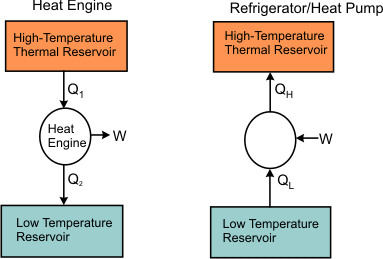Refrigerator
A refrigerator is a cyclically operating device which absorbs energy as heat from a low temperature body and rejects energy as heat to a high temperature body when work is performed on the device. The objective of this device is to refrigerate a body at low temperature. Usually it uses atmosphere as the high temperature reservoir.

Figure 16.2
Refer to figure 16.2. Let  and and  represents the amount of energy absorbed as heat from the low temperature reservoir and the energy rejected as heat to the high temperature reservoir respectively, Let W be the work done on the device to accomplish the task. represents the amount of energy absorbed as heat from the low temperature reservoir and the energy rejected as heat to the high temperature reservoir respectively, Let W be the work done on the device to accomplish the task.
 |
(16.3) |
Therefore,
 |
(16.4) |
and
 |
(16.5) |
Heat engine and the refrigerator (/heat pump) can be represented as shown in Figure 16.2.
The efficiency of a heat engine is given by
 |
(16.6) |
 since since  (heat) transferred to the system cannot be completely converted to work in a cycle. Therefore (heat) transferred to the system cannot be completely converted to work in a cycle. Therefore  is less than unity. A heat engine can never be 100 efficient. Therefore is less than unity. A heat engine can never be 100 efficient. Therefore  i.e., there has always to be a heat rejection. Thus a heat engine has to exchange heat with two reservoirs, the source and the sink. This experience leads to the proposition of the second law of thermodynamics which has been stated in several different ways. i.e., there has always to be a heat rejection. Thus a heat engine has to exchange heat with two reservoirs, the source and the sink. This experience leads to the proposition of the second law of thermodynamics which has been stated in several different ways.
|